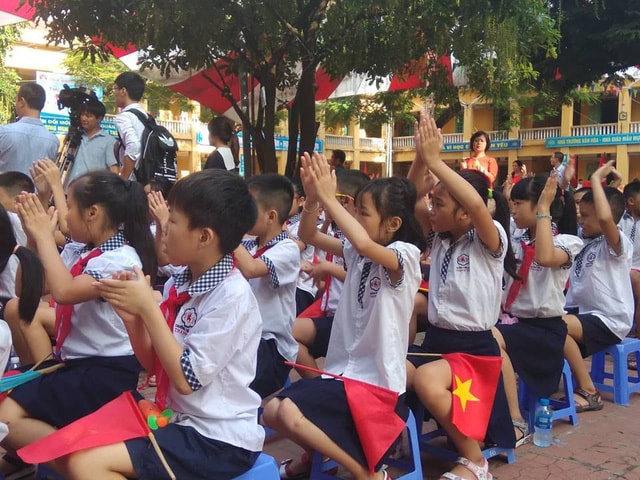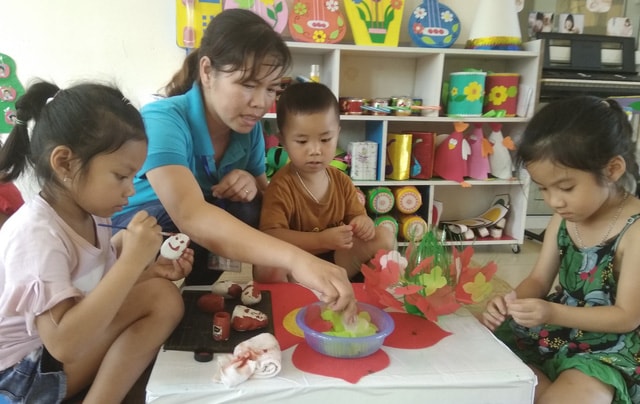Prohibit students from being violent and cliquey in schools
The Ministry of Education and Training has just announced a draft circular amending and supplementing a number of articles of the Charter of kindergartens, primary schools, secondary schools, high schools and general schools. Accordingly, students need to respect differences, not be violent, cliquey, or cause disunity.
Prohibit students from being violent, cliquey, or causing disunity
The Ministry of Education and Training will collect public comments on the Draft Circular (TT) until November 24, 2018.
In which, TT specifically regulates a number of behaviors towards students and teachers.
For students:The draft Circular stipulates that clothing and hair must be neat, clean, and age-appropriate, convenient for studying and living at school; do not wear impolite or offensive clothing.
Regarding language, towards teachers, you need to be respectful and polite; do not use disrespectful language or insult teachers. With friends, you need to be proper, respectful, and friendly; do not swear, curse, or disrespect, causing hurt, resentment, or disunity.
For visitors to the school, language must be appropriate, respectful, and polite. Regarding behavior, towards teachers, students must be respectful, polite, honest, responsible, respect differences, and comply with the assignments of teachers.
 |
| Students need to respect differences, not be violent, cliquey, or cause disunity. (Illustration photo) |
Towards friends, one must be proper, respectful, friendly, cooperative, united, helpful, tolerant and responsible, respecting differences; not violent, cliquey, causing disunity. Towards guests at school, one must behave respectfully, politely and friendly.
Teachers do not insult or hurt students.
In addition, the Circular also regulates behavior, dress and language for the Principal, Vice Principal and staff in the school.
For principals and vice principals:Clothing must be polite, simple, suitable for the environment and educational activities; do not wear impolite or offensive clothing.
Language towards students must be standard, respectful, simple, close, easy to understand; do not use language that offends or hurts children. Need to be standard, respectful, encouraging, motivating; do not use arrogant, insulting, or derogatory language that hurts teachers and staff. For parents of children and visitors to the school, need to be standard and respectful.
Regarding behavior towards students, the principal and vice principal must be exemplary, loving, tolerant and responsible; respect differences; be fair, listen and encourage children's active and creative participation; and not insult, abuse or hurt children.
The principal and vice principal also need to respect, set an example, and accompany each other in work; protect the reputation, honor, dignity, and promote the capacity of teachers and staff; be united, democratic, fair, and transparent; not be prejudiced, biased, insulted, oppressed, harassed, profiteering, avoid responsibility, blame, or cover up violations of colleagues, teachers, and staff.
Respect, courtesy and cooperation are required towards parents and visitors to the school. It is necessary to organize and build a safe, healthy and friendly educational environment; actively prevent and promptly and effectively handle acts of school violence.
 |
| Regarding behavior towards students, teachers need to be exemplary, loving, tolerant and responsible, and not abuse children. (Illustration photo) |
For teachers and staff:Clothing must be polite, simple, and appropriate to the educational environment and each type of activity; do not use impolite or offensive clothing. Language used towards children must be standard, respectful, simple, close, and easy to understand; encourage or remind children appropriately; do not insult or hurt students.
Towards the principal and vice principal, one must be respectful and receptive. Towards colleagues, one must be proper, respectful, and friendly; not insulting, sarcastic, or causing resentment. Towards parents and school visitors, one must be respectful and proper.
Regarding behavior towards students, teachers need to be exemplary, loving, tolerant and responsible; respect differences; be fair, listen, sympathize and encourage, encourage children's active and creative participation; create safety and trust for children; and not abuse children.
With the principal and vice principal, teachers need to be respectful, honest, express their opinions; proactively propose and recommend management measures and quality improvement; comply with the leadership's assignments; and reflect at the right time and place.
Towards colleagues, teachers need to respect differences; protect the reputation, honor, and dignity of colleagues and employees; be united, receptive, listen, share, and support; not be insensitive, factional, or internally divided.
Respect, cooperate, and be friendly to parents and visitors to the school. Actively participate in building a safe, healthy, and friendly educational environment; prevent and promptly and effectively handle acts of school violence.”


